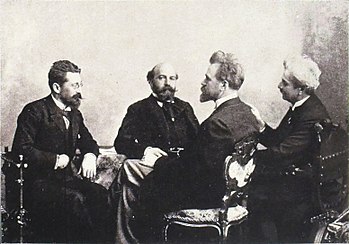Budapest Quartet (1886)

The Budapest Quartet was a string quartet established in Budapest in 1886 by Jenő Hubay and David Popper.
Johannes Brahms performed with the quartet and thought it was the best he had heard.[1]
This quartet went under a variety of names. Outside Hungary, it was usually called "Quartet Hubay-Popper". Within Hungary it was called "Hungarian Quartet" or "Budapest Quartet". This was because Hungarians were fiercely patriotic.[2]
They performed for twenty-seven years.[3]
Composition
[edit]The quartet's initial composition was:
- Jenő Hubay, first violin
- Viktor Herzfeld, second violin
- Bram Eldering, viola
- David Popper, cello
Herzfeld played in 1886-1889 and 1897-1899. Wilhelm Grünfeld (concertmaster of Budapest Opera) played in 1888 the 2nd violin and 1889 József Bloch [hu] (later a teacher at the Music Academy). After then, two students of Hubay played the 2nd violin: in 1894 János Farkas and from 1895 Rudolf Kemény.[4] Elderling left the quartet soon. Violist from 1888 was Josef Waldbauer[5][6][7] and from 1898 Gustav Szerémi.
Notes
[edit]- ^ Potter, The Cambridge Companion to the String Quartet, p.56
- ^ Brandt, Nat (1993), Con Brio: Four Russians Called the Budapest String Quartet, p.33. Oxford University Press
- ^ Avins, Performing Brahms: Early Evidence of Performance Style, p.29
- ^ Dr. Bela Diosy: Ungarischer Künstler Almanach: das Kunstleben Ungarns in Wort und Bild. Musik, Königlich Ungarische Universitätsdruckerei, Budapest 1929, p. 46
- ^ Tibor Frank: Berlin junction: patterns of Hungarian intellectual migrations, 1919-1933 - Hungary and the German Cultural Tradition
- ^ Dr. Bela Diosy: Ungarischer Künstler Almanach: das Kunstleben Ungarns in Wort und Bild. Musik, Königlich Ungarische Universitätsdruckerei, Budapest 1929, p. 46
- ^ Prof. Gianluca La Villa: Hubay e la Scuola ungherese del violino Archived 2004-12-24 at the Wayback Machine
References
[edit]- Potter, Tully (1999). "From chamber to concert hall". In Stowell, Robin (ed.). The Cambridge Companion to the String Quartet. Cambridge Companions to Music. Cambridge University Press. pp. 56. ISBN 0-521-00042-4.
- Campbell, Margaret (1999). "Nineteenth-century virtuosi". In Stowell, Robin (ed.). The Cambridge Companion to the Cello. Cambridge University Press. pp. 70–71. ISBN 0-521-62928-4.
- Avins, Styra. "Performing Brahms's music: clues from his letters". In Musgrave,Michael; Sherman,Bernard D. (eds.). Performing Brahms: Early Evidence of Performance Style. Cambridge University Press. p. 29. ISBN 0-521-65273-1.
